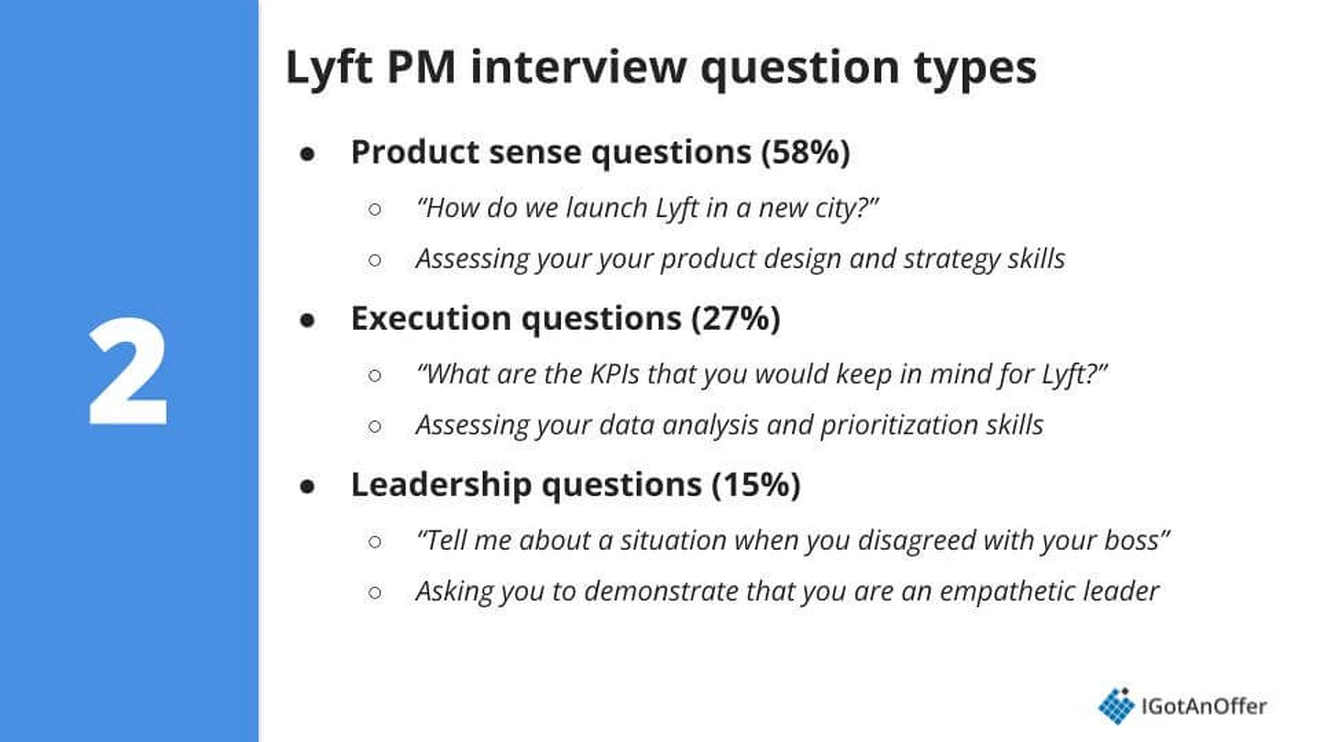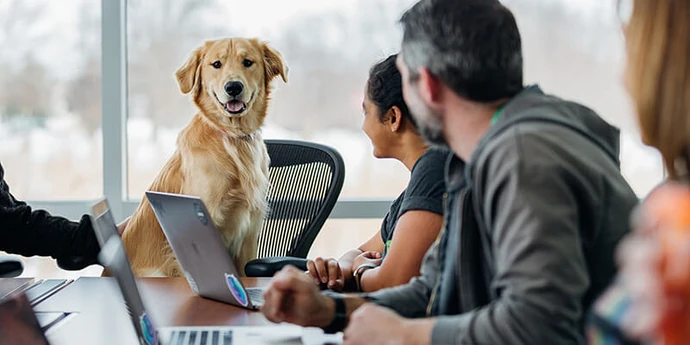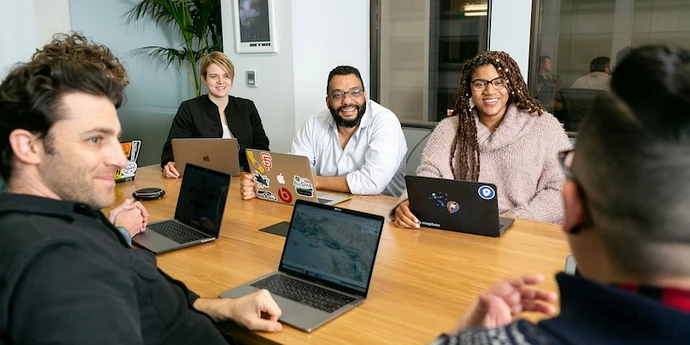Lyft product manager interviews are difficult. You’ll have to answer a wide range of questions that are specific to Lyft and require a high level of product management expertise.
Product sense questions alone account for over half (58%) of past candidates’ reported interview questions at Lyft, so you should be able to demonstrate that you can anticipate user problems and build products that solve them.
Thankfully, thorough preparation will boost your ability to answer these types of questions and land a job offer at Lyft. That’s why we’ve put together this ultimate guide to the Lyft PM interview: to maximize your chance of success.
Here's an overview of what we'll cover:
Click here to practise 1-to-1 with PM ex-interviewers
1. Interview process and timeline
Similar to the timeline at Uber, the interview process for Lyft PMs typically takes around three to five weeks to complete.
Here’s a quick overview of the steps you’ll face along the way:
- Resume, cover letter, referrals
- Recruiter phone screen (30-45 min)
- First-round interviews (2 rounds, 45-60 min each)
- Onsite interviews (2-4 rounds, 45-60 min each)
Now let’s cover the above steps in more detail, so that you'll have a better idea of what to expect and what you'll need to prepare for. For extra help, take a look at our list of top 10 PM interview tips.
Note: if you are interviewing for a product leadership position (VP, Director, Group PM), learn more about the process and how to prepare here.
1.1 Resume, cover letter, referrals
First, recruiters will look at your resume and assess if your experience matches the open position. This is the most competitive step in the process, as millions of candidates do not make it past this stage.
You can use this free resume guide to help tailor your resume to the position you’re targeting.
And if you’re looking for expert feedback, you can also get input from our team of ex-FAANG recruiters, who will cover what achievements to focus on (or ignore), how to fine tune your bullet points, and more.
1.2 Recruiter phone screen
After applying, the interview process typically kicks off with a call from an HR recruiter.
During this call, the recruiter will be digging into your background in order to confirm that you’ve got the necessary skills and qualifications for the role. Be ready to talk about your past experiences, especially those that you list on your resume, as well as why you’re a fit at Lyft.
The types of questions that you can expect will be typical behavioral and resume questions like “why Lyft?”, “walk me through your resume” and “tell me about a product that you’ve launched.”
If you need any clarification about the next steps in the process, this is a good time to ask. Your recruiter should be able to give you an overview of what to expect.
1.3 First-round interviews
Once you’ve passed the recruiter screen, there will be two PM-focused interviews. They may take place over video conference, on the phone, or in Lyft’s physical offices. They usually last for 45-60 minutes.
You’ll be interviewed by a Lyft PM, and you should be prepared for one product sense question and one execution question. You’ll have to dive deep into the problem, explain your reasoning, and work through your thoughts out loud. We’ll give you more details on product sense and execution in section 2.
If you crack the first interviews, your recruiter will move you on to the final round of onsite interviews.
1.4 Onsite interviews
The last step in the process is the onsite portion, which consists of a loop of 2-4 separate interviews. This typically takes place in the Lyft offices, but may take place virtually depending on COVID-19 security measures.
Here, you can expect more product sense and execution interview rounds, as well as a leadership round, which will focus on behavioral and resume questions. We’ve also seen some reports of candidates being asked to give a presentation in one of their final rounds. This appears more frequently in senior PM roles.
As always, your recruiter should be able to provide more details on what you may need to prepare in advance for the onsite interviews.
If all goes well, the onsite interviews are your last step as a candidate, and from there you just have to wait to (hopefully) receive your offer.
2. Question types
Now that you have an idea of the interview process at Lyft, let’s dive into the three types of questions that you can expect. Their interview rounds are very similar to Facebook’s PM interview process, with questions grouped into the following categories:

We've analyzed questions reported by former Lyft PM candidates on Glassdoor.com and categorized the real questions asked for each interview type, listed below. Note that some questions have been edited for clarity or grammar.
Let’s get started.
2.1 Product sense interview questions (58%)
Lyft PMs must be able to evaluate large, ambiguous problems and craft products that solve them. This is where you want to use your product design and product strategy skills.
During product sense interviews, interviewers are looking for candidates who are obsessed with the user, can clearly explain their logic behind each decision, and can break complex problems into manageable pieces.
Expect to play the role of a PM who is directing a team: deciding what to build and who should build it, determining a long-term vision, and anticipating setbacks. Explain your reasoning out loud so that your interviewer comes away with a clear understanding of your approach and working style.
Below, we’ve listed the real product sense questions that past candidates have reported on Glassdoor. These questions are a mix of product design, product improvement and product strategy questions. We recommend studying the articles we've written on each topic to learn how to answer these questions in a structured and impactful way.
Right, let’s get to some questions.
Example PM interview questions asked at Lyft: Product sense
Product design
- Design a dashboard for a food delivery service
- Design an advanced ticket purchase app for a commuter railroad
- Design the Caltrain mobile app
- How would you design the Lyft app for the blind?
- How would you design an efficient ETA system?
- Describe your process on developing an MVP for Lyft Kids.
Product improvement
- How would you improve Lyft?
- How would you improve the pin drop functionality for the Lyft app?
- How would you roll out an algorithm improvement for driver matching?
Strategy
- How would you solve Lyft's commute problem?
- Tell me about a previous product you worked on and a feature you shipped
- How do we launch Lyft in a new city?
- If Lyft were to get into the parking business, what would you do?
- How could we get more drivers to come downtown during peak demand?
To look at the product sense interview in a bit more detail, check out our comprehensive guide. This guide focuses on Facebook, but it could apply to any company.
2.2 Execution interview questions (27%)
Once PMs have made a plan to tackle a problem, they must be able to execute on that plan. You’ll have to show that you can make key, data-based decisions based on analytical results.
This is the part of the interview to display that you have strong analytical and prioritization skills. Interviewers are looking for candidates who can get everything done in a logical order, evaluate trade-offs, and measure results using the most appropriate metrics.
Below, we’ve listed the real execution questions that past candidates have reported on Glassdoor. You’ll notice a fair amount of product metric questions in the mix. The article we’ve written on this topic can help you learn how to answer these questions in a measured, effective way.
Example PM interview questions asked at Lyft: Execution
- Measure the success of a new product and develop a dashboard for it
- What analytics should Lyft consider important?
- What are the KPI's that you would keep in mind for Lyft?
- Triage a drop in a metric by 5% WoW
- How would you execute and assure supply for surge pricing?
- There is a spike in cancellations this week. Why could this be the case?
- If a large number of drivers are dropping out of a particular city, why would it be?
To look at the execution interview in a bit more detail, check out our comprehensive guide. This guide focuses on Facebook, but it could apply to any company.
2.3 Leadership interview questions (15%)
PMs work with a range of different collaborators, such as engineers, designers, data analysts, etc. You’ll need to show that you’re capable of leading yourself and your team, in the face of diverse and unexpected challenges.
Interviewers will want to see that you can rally a cross-functional team across a variety of disciplines in order to collectively comprehend and tackle problems. You will have to demonstrate that you can adjust your leadership style to different personalities, make the most of your resources, and grow from past mistakes.
This interview will be the least structured of the three, but no less important than product sense and execution. Use relevant, concrete, and concise examples from your past to demonstrate the qualities that Lyft is looking for.
Below, we’ve listed the real leadership questions that past candidates have reported on Glassdoor. For more information, take a look at our behavioral interview guide, which is targeted at Facebook but contains a method that is applicable everywhere.
Example PM interview questions asked at Lyft: Leadership
- Why Lyft? (sample answer from Amazon interviews)
- Walk me through your previous work
- Tell me about a challenge you faced
- Tell me about a situation when you disagreed with your boss
- How do you manage projects?
- How do you manage competing priorities?
- How do you handle ambiguity?
If you need more practice, check out our guide on PM behavioral interview questions, which includes sample answers to the top 8 most commonly asked.
And if you're interviewing for an AI-focused PM role, you may also want to check our AI product manager interview questions guide to see what kinds of questions you might get asked
3. Preparation tips
Now that you know what questions to expect, let's focus on preparation.
Below, you’ll find links to free resources and four introductory steps to help you prepare for your Lyft PM interviews.
3.1 Research the product / organization
As you may have noticed from the questions above, it is essential to inform yourself about the company and its products prior to the interviews.
If you neglect this step, you will likely struggle to answer Lyft’s product sense and execution questions, as well as the important “Why Lyft?” question. In this case, interviewers may conclude that you don’t have enough of an interest in the company.
To study up on the company, you can start with videos like this one, which display some of Lyft's core values, such as Deliver Impact and Take Care of Each Other:
Here are some more resources to help you dive a bit deeper:
- Lyft’s mission statement and values (by Lyft)
- Lyft's product-focused Medium page (by Lyft engineering, via Medium)
- What to expect when interviewing at Lyft (by Dan Barak, ex-interviewer and lead product manager at Lyft)
- Lyft's business model (by Jungleworks, from 2016)
One really important thing to bear in mind is that, like most players in its industry, Lyft considers itself much more than simply a taxi app. With motorized scooters and bicycles a growing part of its service, and autonomous vehicles very much part of its long-term plans, Lyft considers itself to be part of the "MAAS" (mobility as a service) revolution.
Be ready to show you're aware of the key issues at play here; sustainability and environmental impact, safety, and changing regulatory frameworks are all factors that will affect you at product level, so be ready to talk intelligently about them.
3.2 Learn a consistent method for answering PM interview questions
As mentioned previously, Lyft will ask you questions that fall into certain categories like behavioral, design, strategy, estimation, and metric questions. Approaching each question with a predefined method will enable you to build strong interview habits.
Then, when it comes time for your interviews, these habits will reduce your stress and help you to make a great impression.
If you’re just looking for a jumping-off point, you can start learning about the different question types you’ll need to master in the following blog articles:
- Product sense interview (Meta guide that also applies to Lyft)
- Execution interview (Meta guide that also applies to Lyft)
-
Leadership interview (Meta guide that also applies to Lyft)
Once you’re in command of the subject matter, you’ll want to practice answering questions. But by yourself, you can’t simulate thinking on your feet or the pressure of performing in front of a stranger. Plus, there are no unexpected follow-up questions and no feedback.
That’s why many candidates try to practice with friends or peers.
3.3 Practice with peers
If you have friends or peers who can do mock interviews with you, that's an option worth trying. It’s free, but be warned, you may come up against the following problems:
- It’s hard to know if the feedback you get is accurate
- They’re unlikely to have insider knowledge of interviews at your target company
- On peer platforms, people often waste your time by not showing up
For those reasons, many candidates skip peer mock interviews and go straight to mock interviews with an expert.
3.4 Practice with experienced PM interviewers
In our experience, practicing real interviews with experts who can give you company-specific feedback makes a huge difference.
Find a Lyft product manager interview coach so you can:
- Test yourself under real interview conditions
- Get accurate feedback from a real expert
- Build your confidence
- Get company-specific insights
- Learn how to tell the right stories, better.
- Save time by focusing your preparation
Landing a job at a big tech company often results in a $50,000 per year or more increase in total compensation. In our experience, three or four coaching sessions worth ~$500 make a significant difference in your ability to land the job. That’s an ROI of 100x!















